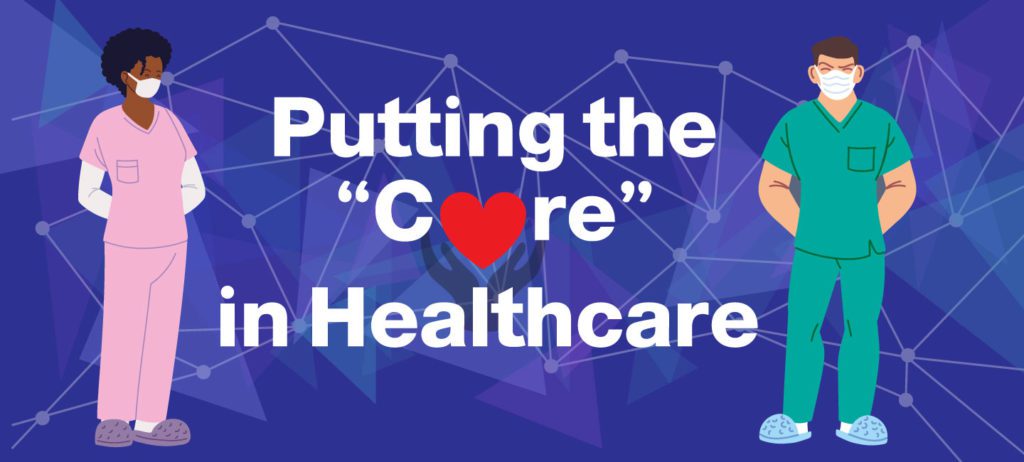According to the Merriam-Webster Dictionary, the care we find in the term healthcare means the “efforts made to maintain or restore physical, mental, or emotional well-being especially by trained and licensed professionals.” In other words, it is attentiveness to the totality of a person and the tending to one’s entire self, assuring wellness is a wholeness experience. Everything that makes a person function is considered, and steps are put into action to ensure utmost performance is obtained and quality of life is sustained. This kind of mindfulness defines the care we find in “healthcare.”

When we step back and reflect on this meaning, it becomes a notable reminder of how vital healthcare professionals are. Medical providers aren’t important; we are essential. The need for us just isn’t due to an unknown virus. We are a requirement if the world desires to live their best lives. Having the ability to access and restore the full person is an incredible power to own. Indeed, we are a force to be reckoned with!
Possessing the power to treat not only the body but also the heart and mind is a great responsibility that we in healthcare have raised our hands and said yes to. As we scan across the various specialties and fields of medicine for brave examples of how to deploy this power best, our nurses are undoubtedly masters of care. For many of them, the ability and expectation of caring for a person’s entire well-being are among the top reasons they suited up for the role.
The article, Why I Love Being a Nurse: Responses from 12 RNs, highlights the core reasons why a dozen nurses chose this career as their life’s calling. The common sentiment from each: providing patients personal touch and care. Giving this unique gift drove them into nursing, and it is what keeps them there. The individuals in the article paint pictures of holding patients’ hands during their final seconds, cheerleading a patient to triumph over a condition, and leaving an imprint of unforgettable compassion in a patient’s memory. Physical care is what meets the eyes, but nursing involves so much more.
Yes, those of us in this field must be equipped to apply evidence-based research and critical thinking and possess the scientific knowledge needed to execute healthcare processes and procedures efficiently. However, caring is the bedrock of nursing. It is the ingredient used to perform the job with excellence and accuracy. It is also the secret weapon used to treat all ailments and will only jeopardize our patients if left out.
Patient care exceeds the medical aspect of nursing. We need to treat a patient’s physical condition as well as their emotional and mental needs. Nurses are permitted to show empathy, resulting in a collaborative relationship with patients. This rapport becomes a resource that can help root out causes, symptoms, or explanations that help reach a proper diagnosis and appropriate treatments. A strong relationship between provider and patient also creates a space where people can feel safe. Security leads to less stress, and with reduced stress comes faster healing or, given the circumstance, a more pleasant send-off.
We also hear our 12 voices state that nursing is demanding and constantly evolving. It isn’t easy tending to the well-being of the whole person. Nurses must still show concern for and extend kindness to each and every patient while caring for more patients in less time. Improve the quality and the safety of the care they provide while juggling efficiency of care. We can’t sacrifice one over the other.
Coupled with strong patient relationships, point-of-care ultrasound (POCUS) peaks as another resource extending both care and efficiency to our patients. A modality that keeps medical professionals at the bedside of our patients conveys closeness and attentiveness. POCUS gives nurses reason to come near. Often being the “face” of care, this nearness also communicates focus, perfecting this poster child image. POCUS gives the ability to preserve eye contact with patients with nothing but a handheld device between patient and nurse.
Additionally, the rapid diagnosis ability of POCUS allows care plans to be developed accurately in real-time. This sufficient speed provides nurses more time to do the more being asked of them while still giving patients the level of care needed for their individual situation. This device and other tools make the unimaginable imaginable.
It is possible! Those who bear the name nurse have taught us that there is always room to care for the complete person, and as medical professionals, we should continuously clear a pathway for it. Let’s learn from our fellow nurses who, without apology, exemplify, exuberates, and puts the “care” in healthcare!
_____
Want to learn more about the impact POCUS is having on patient care? Visit our education and training resources page for more in-depth insights. Ready to get started on your POCUS journey? Check out our many certificate and certification options here.





















